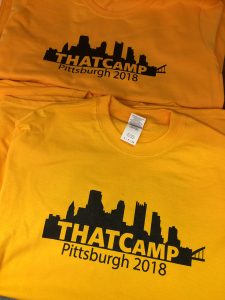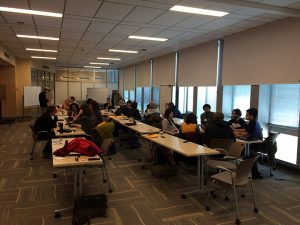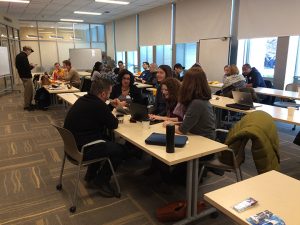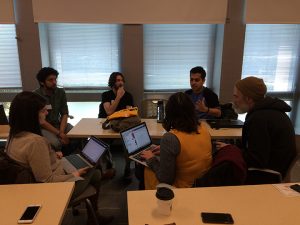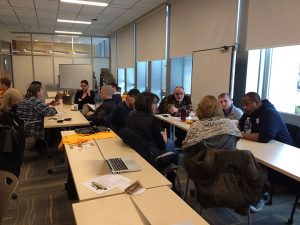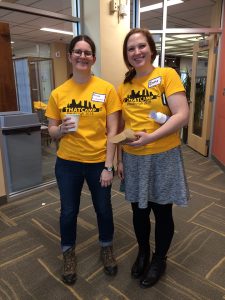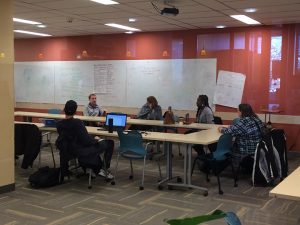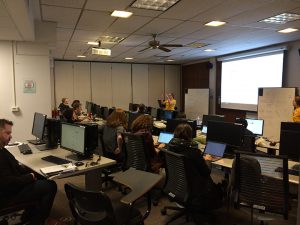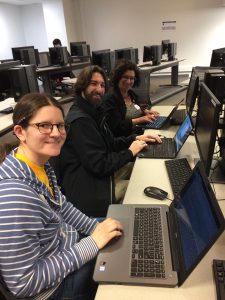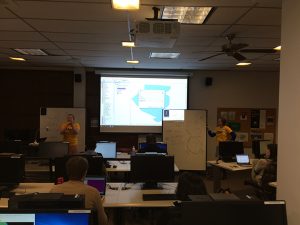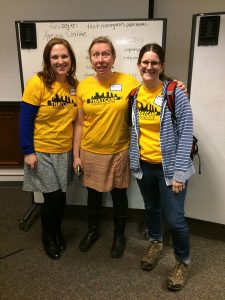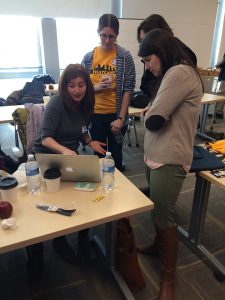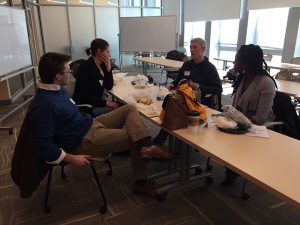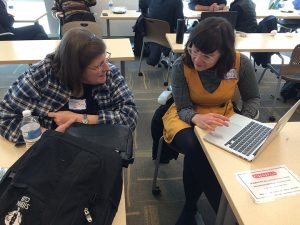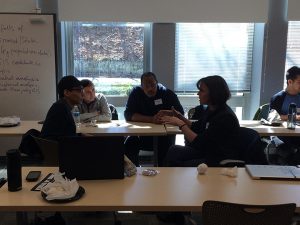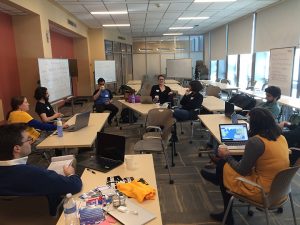THATCamp Pittsburgh 2018 met this past weekend and was a great success. Thanks to our organizing team (Jessica Benner, Susan Grunewald, Jessica Otis, Abigail Owen, and Emma Slayton) as well as our awesome sponsors (dSHARP, CMU’s Department of History, the Frank-Ratchye STUDIO for Creative Inquiry, and the DHRX).
Tag Archives: events
THATCamp Pittsburgh 2018
Please join us for THATCamp Pittsburgh 2018, with our theme of Mapping and GIS.
Scholars and citizens have long been interested in using maps and mapping techniques to convey information about the world, with innovative maps dating back centuries. The rise of Geographic Information Systems in the latter half of the 20th century have further provided us with new tools and methods for interpreting spatial information. These techniques and tools can be used for great analytic effect by a range of scholars, from humanists to social scientists to artists and beyond. Therefore, the intended audience for our THATCamp is not just digital humanists but anyone who is interested in the intersection of mapping and GIS with humanistic lines of inquiry.
Examples of this intersection include
- exploring the history of red-lining in American cities, such as was done by the University of Richmond’s Mapping Inequality project
- studying how GIS changes our relationship with space and the cities where we live
- mapping Stonehenge and examining how this activity affects our understanding of neolithic construction processes
- … and more!
So if you’re interested in mapping, GIS, or broadly technology in the humanities, please register to join us on March 3rd, 2018 for THATCamp Pittsburgh 2018!
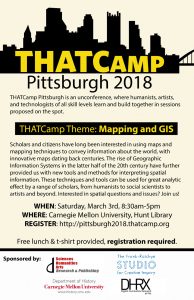
Visiting Speakers: Mark Newton and Alex Gil, February 15
Digital Scholarship at Columbia University Libraries:
Past, Present, and Future
Thursday, February 15
4:30 – 6:00 pm
The Den in the Sorrells Library
4400 Wean Hall
Carnegie Mellon University
Description:
Over the course of several years, the Columbia University Libraries have built a comprehensive program of digital scholarship across its campuses—connecting with faculty and student scholars to support learning needs and research agenda with access to technologies, systems, and expertise in digital workflows. From scholarly communication to computational support to the emergent methods and tools of the digital humanities, the libraries have moved from innovation and experimentation to maturing models for doing this work. Mark Newton will explore select scholarly projects and technical development around digital publishing and archiving workflows, highlighting the outcomes for library and scholars in partnership to advance knowledge from both within the institution and communicated to broad audiences beyond.
Dr. Alex Gil will follow Mark Newton’s presentation with an introduction to the life and mission of the Butler Studio. The Studio was founded five years ago as a tech-lite, co-working library space in order to foster digital scholarship in the humanities and humanistic social sciences. Though the United States boasts many digital humanities and digital scholarship labs, centers and now library divisions, the Studio is one of the few to have achieved the much desired active intersection between faculty, students and librarians—a true hybrid space of intellectual production within a large research library. In this presentation, Gil will offer perspectives on what makes that achievement at Columbia particularly unique, how it was accomplished and what other collectives may learn or avoid from it.
Bios:
Mark Newton is the Director of Digital Scholarship at Columbia University Libraries. His work focuses on the development of the library’s scholarly publications partnership program, the Academic Commons institutional repository, and a variety of faculty- and student-led digital scholarship projects. He currently serves on the project staff for Humanities CORE, an NEH-funded digital humanities project with the Modern Language Association, pairing repository infrastructure with the MLA Commons community hub.
Alex Gil is Digital Scholarship Coordinator at Columbia University Libraries and Affiliate Faculty of the Department of English and Comparative Literature at Columbia University. He collaborates with faculty, students and library professionals leveraging computational and network technologies in humanities research, pedagogy and knowledge production. He is among the founders of several ongoing, warmly received initiatives where he currently plays leadership roles: Co-director of the Studio@Butler at Columbia University, a tech-light library innovation space focused on digital scholarship and pedagogy; faculty moderator of Columbia’s Group for Experimental Methods in the Humanities, a vibrant trans-disciplinary research cluster focused on experimental humanities; current chair of Global Outlook::Digital Humanities, an interest group connecting scholars around the world; senior editor of sx archipelagos, a journal of Caribbean Digital Studies, and co-wrangler of The Caribbean Digital conference series. Current projects include Ed, a digital platform for minimal editions of literary texts; Aimé Césaire and The Broken Record, a minimal computing experiment in long-form digital scholarship; and, In The Same Boats, a visualization of trans-Atlantic intersections of black intellectuals in the 20th century.
Spring 2018 Office Hours
Our Spring 2018 semester office hours will be held every Wednesday, 12:30-2:50pm in Hunt Library Studio B. Have questions about digital research or publishing? Feel free to drop in.
Visiting Speaker: Shannon Mattern, Feb. 1-2
Visiting Speaker: Heather Froehlich, Oct. 26-27
CMU’s new dSHARP center is kicking off an annual speaker series. We’ll be bringing in scholars for talks and/or workshops on a variety of digital research and publishing subjects which will hopefully be of interest to the greater Pittsburgh DH community.
Our first visiting speaker is Heather Froehlich of Penn State, whose visit is co-sponsored by the English Department’s Digital Media Lab at the University of Pittsburgh and the DHRX. She will be giving a talk on Thursday Oct. 26 and a workshop on Corpus Linguistics with AntConc on Friday October 27th.
THURSDAY, OCTOBER 26
4:30-6:00pm • 202 Frick Fine Arts
University of Pittsburgh
In the early modern period, women were passed from father to husband, and in particular were insulted and debased by accusations of ‘whore’ (i.e. not chaste and not silent) when they acted out against an established social order of male empowerment. Kay Stanton, in her chapter in a Feminist Companion to Shakespeare (2010), lists and describes all the ways the word ‘whore’ is used to demean women in
Shakespeare’s plays. In this talk, I will use the Historical Thesaurus of the Oxford English Dictionary (http://oed.com/thesaurus) to present a larger list of terms synonymous with ‘whore’ in use during Shakespeare’s life. With a larger lexicon for feminine lack of purity, it is possible to show a better picture of how whorishness and feminine dishonour is constructed in Shakespeare’s plays.
FRIDAY, OCTOBER 27
10am-12pm • CFA 317
Carnegie Mellon University
Corpus Linguistics with AntConc
Corpus analysis is a form of text analysis which allows you to make comparisons between textual objects at a large scale (so-called ‘distant reading’). This hands-on workshop explores the basic principles of quantitative text analysis using a graphical user interface. We will discuss how to use computers to identify patterns in language by covering a few basic principles of corpus methods, including keywordin-context analysis, very basic statistics, and how computers can be used to generate more nuanced questions for a given dataset.
As is common for visiting scholars, we will be hosting a small dinner for her on Thursday night. We will also be hosting a “kaffeeklatsch” (a small group hanging out over coffee/tea) either Thursday morning or Thursday early afternoon depending on when people are available. We very much want to have a good mix of CMU and Pitt folks at each of these, ideally with both people who are already actively involved in our DH community as well as “DH-curious” folks who’d like to learn more about what we do.
Fall 2017 Office Hours
Our Fall 2017 semester office hours will be held every Wednesday, 1:30-4:30pm in Hunt Library Studio B. Have questions about digital research or publishing? Feel free to drop in.
PGH|DH Fall Social Gathering
am dh: a Morning of DH Research
Friday, May 5th
9am-12pm
featuring talks by
David Bamman, School of Information, UC Berkeley
Scott Weingart, Digital Humanities Specialist, Carnegie Mellon
Porter Hall 222C
DH Reading Group: April
Who: anyone interested in reading analytical articles encompassing the digital humanities, including but not limited to digital history
What: read some stuff of interest to the group members, get together over food or drinks and discuss the readings
When: April 26th, 5pm-6:30pm and repeated on the last Wednesday of every month
Where: We are still questing for the perfect meeting location. This time, we’ll try the back room at Hemingway’s Cafe (3911 Forbes Ave).
Our readings this month will be:
– The Transnational and Text Searchable, Lara Putnam: https://academic.oup.com/ahr/article/121/2/377/2581842/The-Transnational-and-the-Text-Searchable
– GIS and Literary History: Advancing Digital Humanities research through the Spatial Analysis of historical travel writing and topographical literature, http://www.digitalhumanities.org/dhq/vol/11/1/000283/000283.html
